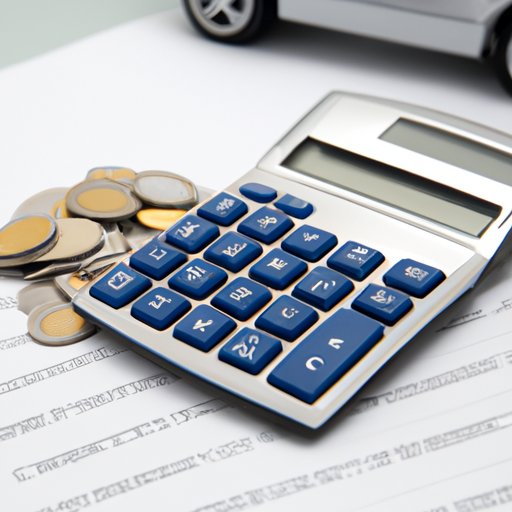Introduction
Buying a car is an exciting experience – but it can also be daunting. With so many choices and factors to consider, it’s easy to feel overwhelmed. One of the most important decisions you’ll make is how long you want to finance the car. The length of your loan can have a major impact on your budget and the total cost of ownership.
This article will provide an overview of the different financing options available and help you determine the best option for your budget. We’ll cover the total cost of ownership, compare interest rates, explore leasing vs. buying, and discuss the tax advantages of auto loans.

Calculating the Total Cost of Car Ownership
Before you start considering financing options, it’s important to understand the total cost of car ownership. This includes more than just the purchase price – you’ll also need to factor in depreciation, insurance, maintenance, and fuel costs. According to the experts at Kelley Blue Book, “The total cost of owning a car over five years can range from $20,000 to nearly $50,000.”
Understanding Depreciation
Depreciation is one of the biggest expenses associated with car ownership. It’s the difference between the car’s original value and its value after you’ve owned it for a certain period of time. According to Edmunds, “Most cars lose about 20% of their value in the first year after they’re purchased, and then another 10% each year after that.”
Researching Insurance Costs
Insurance costs vary depending on the type of car you buy, your driving record, and other factors. It’s important to research insurance costs before making a purchase to ensure you can afford to insure the vehicle.
Calculating Fuel Costs
Fuel costs can add up quickly, especially if you’re driving a gas-guzzler. To get an estimate of how much you’ll be spending on fuel each month, use an online calculator like the one from FuelEconomy.gov. Simply enter the make, model, and year of the car you’re considering, and the calculator will give you an estimate of the fuel costs.
Exploring Different Financing Options
Once you’ve calculated the total cost of car ownership, you can start exploring different financing options. Here are some of the things you should consider:
Comparing Interest Rates
Interest rates are one of the most important factors to consider when financing a car. The higher the interest rate, the more you’ll pay over the life of the loan. Compare rates from different lenders to find the best deal.
Loan Terms
The loan term is the amount of time you have to pay off the loan. Most car loans range from two to seven years, but some lenders may offer longer terms. A longer loan term means lower monthly payments, but you’ll end up paying more in interest over the life of the loan.
Benefits of Early Payoff
If you can afford to, it’s always a good idea to pay off your loan early. Doing so can save you money in the long run, as you’ll avoid paying interest on the remaining balance of the loan. Some lenders may even offer incentives, such as waived fees or lower interest rates, for early payoff.

Tips for Stretching Your Car Loan
If you’re looking for ways to stretch your car loan and reduce your monthly payments, here are some tips:
Refinancing
If you’ve had your loan for a while and interest rates have dropped, you may be able to refinance your loan and get a lower rate. This can help you save money in the long run.
Seeking Out Low-Interest Loans
If you’re shopping for a new loan, look for lenders that offer low-interest rates. Doing your research can help you save money over the life of the loan.
Making Extra Payments
Making extra payments whenever possible can help you pay off your loan faster and reduce the amount of interest you’ll pay. Even small payments can make a big difference over time.
Understanding Leasing vs. Buying
Leasing and buying both have their advantages and disadvantages. It’s important to understand the pros and cons of each option before making a decision.
Pros and Cons of Each Option
When leasing a car, you won’t own it, so you won’t have to worry about depreciation or selling it when you’re done. However, you’ll still be responsible for maintenance and repair costs. When buying a car, you’ll own it outright, so you won’t have to worry about mileage limits or returning the car at the end of the lease. However, you’ll be responsible for all costs associated with ownership, including depreciation, maintenance, and repairs.
Advantages of Leasing
One of the main advantages of leasing is that you’ll usually have lower monthly payments, since you’re only paying for the portion of the car’s value that you’ll use during the lease period. Additionally, you can often get a new car every few years, which can be appealing for those who don’t want to deal with the hassle of selling a car.
Advantages of Buying
When you buy a car, you’ll own it outright, so you won’t have to worry about returning it at the end of the lease. Additionally, you can customize the car to your liking and sell it whenever you want. Finally, you may be able to get a better deal on a used car than you would on a leased car.
Tax Advantages of Auto Loans
If you’re buying a car, you may be eligible for certain tax deductions. Be sure to speak with a tax professional to determine if you qualify.
Deductions for Vehicle Purchases
If you’re buying a car for business use, you may be able to deduct part or all of the purchase price on your taxes. According to the IRS, “You may be able to deduct the cost of the car if you use it solely for business purposes.”
Deductible Interest Payments
If you’re taking out a loan to finance the car, you may be able to deduct the interest payments on your taxes. According to TurboTax, “The IRS allows you to deduct the interest you paid on a loan for a car if it was used for business purposes.”
Conclusion
Buying a car can be a daunting task, but understanding the different financing options can help make the process easier. When considering how long to finance a car, remember to factor in the total cost of ownership. Compare interest rates, loan terms, and leasing vs. buying to find the best option for your budget. Finally, take advantage of any tax deductions you may be eligible for.
(Note: Is this article not meeting your expectations? Do you have knowledge or insights to share? Unlock new opportunities and expand your reach by joining our authors team. Click Registration to join us and share your expertise with our readers.)
